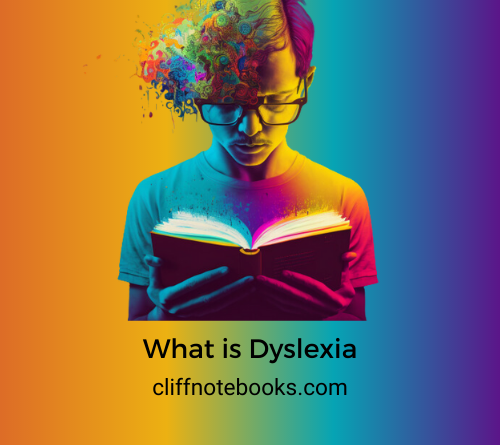What is Dyslexia? | Cliff Note Books
Dyslexia is a learning disorder that affects a person’s ability to read, write, and spell. People with dyslexia have difficulty processing language, which can make reading and writing challenging. Dyslexia is a neurological condition that affects between 5% and 17% of the population.
What Causes Dyslexia?
The exact cause of dyslexia is unknown, but researchers believe that it is related to differences in the way the brain processes language. Dyslexia is often hereditary and can run in families. It is also more common in boys than girls.
How is Dyslexia Diagnosed?
Dyslexia is usually diagnosed by a psychologist or educational specialist. They will conduct a series of tests to assess the person’s reading, writing, and spelling abilities. These tests may include reading comprehension tests, phonemic awareness tests, and spelling tests.
How is Dyslexia Managed?
There is no cure for dyslexia, but there are strategies that can help manage it. People with dyslexia may benefit from specialized reading programs, such as Orton-Gillingham, which focus on phonics and decoding skills. They may also benefit from using assistive technology, such as text-to-speech software, which can read text aloud.
How Does Dyslexia Affect Reading?
People with dyslexia have difficulty recognizing and decoding words, which can make reading slow and laborious. They may also have difficulty with reading comprehension, which can make it difficult to understand what they have read. Dyslexia can also affect spelling, as people with dyslexia may have difficulty remembering how to spell words correctly.
How Does Dyslexia Affect Everyday Life?
Dyslexia can affect many aspects of everyday life, including school and work. People with dyslexia may struggle in school, particularly in subjects that require reading and writing. They may also have difficulty with time management and organization. In the workplace, people with dyslexia may have difficulty with written communication, such as emails and reports.
Dyslexia and Reading
Decoding is the process of translating written symbols (letters and words) into their corresponding sounds. For people with dyslexia, decoding can be challenging because they may have difficulty recognizing and distinguishing between letters, or they may have difficulty sounding out words. This can make reading slow and laborious, and it can also make it difficult to comprehend what is being read.
Fluency is the ability to read smoothly and quickly. People with dyslexia may struggle with fluency because they may need to stop and sound out words, which can disrupt the flow of reading. This can make it difficult to keep up with reading assignments and can make reading a frustrating experience.
Comprehension is the ability to understand what is being read. People with dyslexia may have difficulty with comprehension because they may be focused on decoding words rather than understanding the meaning of the text. They may also have difficulty with working memory, which can make it difficult to hold information in the mind and use it to make connections between different parts of the text.
It’s important to note that dyslexia affects people in different ways, and not all people with dyslexia will have difficulties with all aspects of reading. Some people with dyslexia may be able to read fluently but struggle with comprehension, while others may be able to understand what they are reading but struggle with decoding.
Fortunately, there are strategies that can help people with dyslexia improve their reading skills. One of the most effective strategies is a structured literacy approach, which focuses on teaching phonics and decoding skills in a systematic and explicit way. This can help people with dyslexia improve their ability to recognize and decode words, which can in turn improve fluency and comprehension.
Assistive technology can also be helpful for people with dyslexia. Text-to-speech software, for example, can read text aloud, which can make it easier for people with dyslexia to access and comprehend written information. Other types of assistive technology, such as speech-to-text software and spellcheckers, can also be helpful for people with dyslexia.
In conclusion, dyslexia can affect many aspects of reading, including decoding, fluency, and comprehension. People with dyslexia may need support and accommodations to help them improve their reading skills, such as a structured literacy approach or assistive technology. It’s important to remember that dyslexia is a complex condition that affects people in different ways, and that with the right support, people with dyslexia can achieve success in school, work, and everyday life.
In conclusion, dyslexia is a learning disorder that affects a person’s ability to read, write, and spell. It is often hereditary and can run in families. There is no cure for dyslexia, but there are strategies that can help manage it, such as specialized reading programs and assistive technology. Dyslexia can affect reading and spelling, as well as many aspects of everyday life, including school and work.
